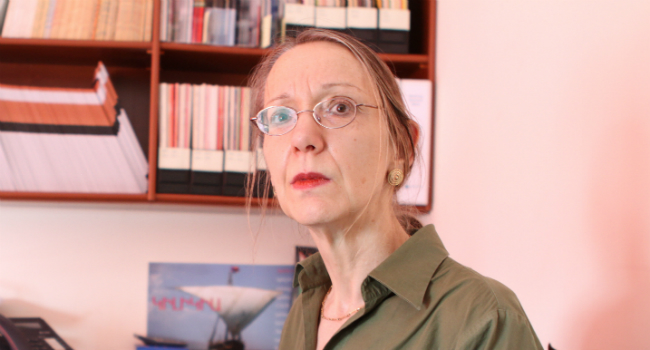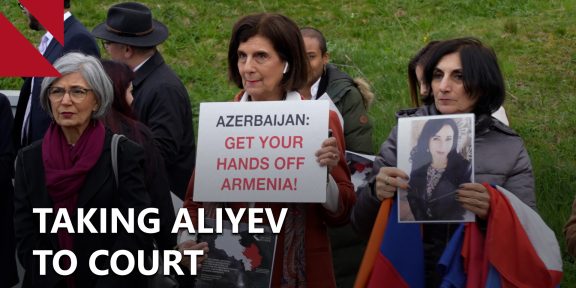 Liz Fuller, a journalist and expert on the South Caucasus says the Georgian elections showed “peaceful democratic regime change is possible, even when the ruling party uses administrative resources on a massive scale.”
Liz Fuller, a journalist and expert on the South Caucasus says the Georgian elections showed “peaceful democratic regime change is possible, even when the ruling party uses administrative resources on a massive scale.”
Ivanishvili’s victory seems to be unexpected. Why did Georgians vote for him, given that the country had made such huge progress under President Mikheil Saakashvili? What was wrong with Saakashvili?
The Central Election Commission still has not announced the preliminary results of the election, so it’s not clear just how large a majority Bidzina Ivanishvili’s Georgian Dream coalition will have in the new parliament: it may have up to 97 of the 150 mandates, but the figure could be lower. True, GD won in the party list vote, but we still don’t know how many of the 73 single-mandate constituencies it won. It may end up with just 10-15 mandates more than the United National Movement.
From that point of view, it was unexpected that President Mikheil Saakashvili conceded the defeat of his United National Movement when not even half the votes had been counted and it was still hypothetically possible that his party might have won by a very slim margin.
I see two main reasons why so many Georgians were disenchanted with Saakashvili and his team. The first is that in Georgia, as in Armenia, the primary problem is unemployment. Also a problem is the comparatively high cost of medical services. Even if people did not trust Ivanishvili to tackle those issues, they may have been alienated by Saakashvili’s use of budget funds for projects that do not benefit the population in any way – like building a new parliament building in Kutaisi at a cost of $361 million, or his plans to build a new port on the Black Sea coast that would cost twice that amount.
The second is the scandal last month over the use of torture in Georgian prisons – not just that such appalling things happened, but that the Georgian leadership turned a blind eye to them for so long, even though for years two successive human rights ombudsmen had chronicled the abuses. The young Georgians who took to the street in protest after the video clips of mistreatment were broadcast were clearly not just outraged; they were ashamed to live in a country where such things were possible.
So it’s difficult to say whether Georgian Dream’s win is because voters actively support Ivanishvili, or because voting for him was the most effective way of getting rid of Saakashvili and his party.
Do you think Ivanishvili will continue the reforms Saakashvili started and with which his name has become synonymous? Is there a way back for Georgia?
One of Saakashvili’s main arguments against Georgian Dream was that it would reverse the reforms he had spearheaded and return Georgia to stagnation. Eduard Shevardnadze, incidentally, argued exactly the same thing in the run-up to the November 2003 parliamentary election that culminated in the Rose Revolution.
There are absolutely no grounds for such scare-mongering on Saakashvili’s part. Georgian Dream is committed to continuing the kind of reforms Saakashvili’s party began, both economic and social. It gives priority to promoting small and medium business. It specifically plans to try to revive the agricultural sector, which in turn will help to resolve the problem of rural poverty and unemployment.
And in terms of foreign policy, Georgian Dream is committed to Saakashvili’s objectives of securing EU and NATO membership.
There are speculations that Ivanishvili’s victory will bring some improvement in relations with Russia. In what extent these relations can be improved?
There is indeed grounds for optimism that relations with Russia will improve, for two reasons. The first is that the personal enmity between Saakashvili and Russian President Vladimir Putin that poisoned bilateral relations for years is no longer relevant – or it won’t be once Saakashvili’s second term ends in January. True, Putin has not yet commented on Georgian Dream’s election victory, but Prime Minister Dmitry Medvedev said the Georgian opposition’s victory in the October 1 parliamentary elections had shown that the population of this country wants changes.
Federation Council chair Valentina Matvienko said yesterday that “we very much hope” Georgian Dream’s victory will positively influence the development of bilateral relations.
The second is that Ivanishvili and his team are pragmatists, which means they will approach the issue of restoring formal diplomatic relations with Moscow from the point of view of Georgia’s national interests, whereas Saakashvili based his approach primarily on taking the moral high ground and depicting Russia as the source of all Georgia’s failures.
How do you think Georgian elections can affect Armenia’s 2013 presidential campaign, given the similarities between Georgian Dream and Prosperous Armenia?
I don’t think one should put too much emphasis on the superficial similarity between Bidzina Ivanishvili and Gagik Tsarukian. Mr. Tsarukian and Bargavach Hayastan have been part of the Armenian political landscape for quite a long time, and they are not the only political alternative to President Sargsian, while Ivanishvili appeared out of nowhere a year ago and swiftly became the only truly effective and attractive opposition force.
That said, Georgian Dream’s election victory does send two messages to Armenian voters: first, that peaceful democratic regime change is possible, even when the ruling party uses administrative resources on a massive scale to predetermine the election outcome, but that every single vote counts, and therefore indifference and apathy and not bothering to go and vote are not an option.
And second, that such a victory was possible only because the Georgian election was essentially a two-horse race between Saakashvili’s party and Ivanishvili. Which suggests that to repeat it in Armenia would require all those political forces who want to deprive President Sargsian of a second term to close ranks behind a single opposition presidential candidate.
















